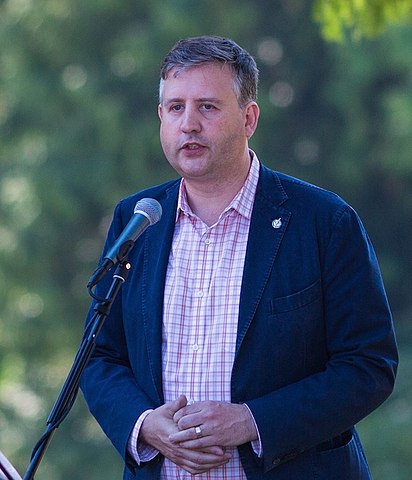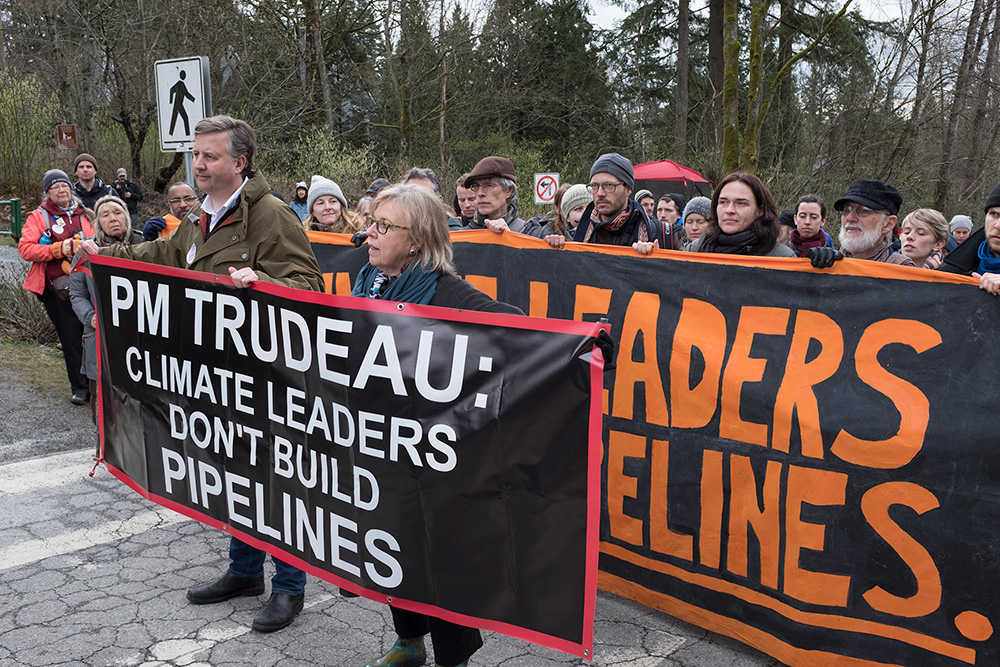Kennedy Stewart, politician, academic, mayor of Vancouver 2018–22 (born 8 November 1966 in Halifax, Nova Scotia). Kennedy Stewart served as a Member of Parliament for Burnaby-Douglas and Burnaby South and was a member of the federal NDP caucus. He is also an associate professor on leave at Simon Fraser University’s School of Public Policy. Stewart was elected the 40th mayor of Vancouver on 20 October 2018. He presided over a gridlocked and dysfunctional city council and lost his re-election bid on 15 October 2022.

Early Life
Kennedy Stewart was born in Halifax, Nova Scotia. In a period of economic instability and rising mortgage rates, the Stewart family lost their home after his father lost his job and the family went bankrupt. This early experience deeply affected him, shaping his later political focus on housing affordability and homelessness.
Personal Life
Kennedy Stewart is also a musician. When he first moved to Burnaby, British Columbia, he played bass guitar for State of Mind, a pop band that won three West Coast Music Awards in 1991. Stewart is married to Jeanette Ashe, a professor who chairs the department of Political Science at Douglas College in New Westminster, BC.
Education and Early Career
Kennedy Stewart earned his bachelor’s degree in history from Acadia University. In 1989, he left Nova Scotia and moved to Vancouver with only $100 in hand. He worked at a variety of jobs, including running a printing press, playing in a band and delivering beer.
While working with the City of Vancouver’s planning department and park board, Stewart became fascinated by how cities work. He decided to complete a master’s degree in urban politics and policies at Simon Fraser University (SFU). He went on to pursue a PhD at the London School of Economics, where he studied world cities. In 2002, Stewart returned to Vancouver to work as a professor in the School of Public Policy at SFU. In addition to teaching, he advised governments and the United Nations on housing and cities.

Political Career
Kennedy Stewart first ran for federal politics in 2004 as an NDP candidate representing Vancouver Centre, but he was defeated. In 2011, he ran again and was elected as a Member of Parliament (MP) for Burnaby–Douglas; he was reelected in 2015. As an MP, Stewart worked in two main areas: environmental activism and advocating for greater federal investment in affordable housing.
During his two terms as MP, Stewart served as the opposition critic for science and technology. In 2013, he introduced a motion for the government to modernize the petitioning process by accepting electronic petitions from constituents, in addition to traditional paper petitions. E-petitions have been accepted since 2015 and have helped to increase democratic participation.
Stewart has authored articles on public policy and democracy. In 2017, he collaborated with fellow politicians, Liberal Scott Simms and Conservative Michael Chong, on the book Turning Parliament Inside Out: Practical Ideas for Reforming Canada’s Democracy.
Activism
During his time as MP, Kennedy Stewart worked hard to stop Kinder Morgan from building its proposed Trans Mountain pipeline expansion, with a terminal in Burnaby. The expansion was approved by the federal government in 2016. In March 2018, Stewart was arrested for blocking access to Kinder Morgan’s facilities while protesting the pipeline expansion in Burnaby. Along with Green Party leader Elizabeth May and other protestors, Stewart violated a court order to leave 5 m of clearance at work sites while demonstrating. He pleaded guilty to criminal contempt of court and received a $500 fine.

Mayor
In September 2018, Kennedy Stewart resigned his seat in the House of Commons to run for mayor of Vancouver as an independent candidate. During his campaign, Stewart focused on four main issues: affordable housing, sustainable economic growth, the environment and growing a compassionate city in the face of the opioid crisis. He also emphasized collaboration between progressive politicians to bring more progressive policies to Vancouver. On 20 October 2018, Stewart won the election to become mayor. He defeated his main rival, businessman Ken Sim, the Non-Partisan Association candidate, by a margin of only 957 votes.
Housing Affordability and Homelessness
Kennedy Stewart’s top priority as mayor was Vancouver’s home affordability crisis. During his campaign, Stewart promised to protect the city from land speculators and foreign investors, who had driven up home prices. He promised to build 25,000 new non-profit affordable rental homes and 35,000 affordable units for first-time homebuyers (such as condos, townhouses, and coach houses) over the next decade. In February 2019, city council approved a major construction project in conjunction with BC Housing and Vancouver Coastal Health; 90 units of long-term affordable housing would be built, as well as a drug withdrawal management centre at East First Avenue and Clark Drive in the Downtown Eastside.
Sustainable Economic Growth
During his 2018 mayoral campaign, Stewart expressed support for arts and culture. He promised to increase funding for the arts, to expand library services and to build 100,000 square feet of affordable studio space for creators. Stewart promised support for small businesses, with plans to build a new start-up hub for businesses in the tech sector. Under his leadership, city council plans to review all policies that impact small businesses.
Environment
Stewart also promised to continue working toward Vancouver’s goal of becoming the greenest city in the world, a vision set out in previous mayor Gregor Robertson’s Greenest City 2020 Action Plan. Stewart professed continued support for bike lanes, public transit without fossil fuels, and clean technology. As mayor, Stewart continued to fight the Trans Mountain pipeline extension project. He continued Vancouver’s role of supporting Indigenous groups in court challenges to the pipeline expansion. In November 2018, he met with Prime Minister Justin Trudeau and pledged to continue to fight the pipeline.
Drug Crisis
Soon after he became mayor of Vancouver, Stewart implemented an emergency task force to help address the city’s drug crisis. British Columbia’s provincial health officer had declared the opioid overdose crisis a public health emergency in April 2016. The goals of the new task force were to prevent deaths from fentanyl; to explore all options for drug policy; to expand safe injection sites; and to work with the provincial and federal governments to negotiate a new Vancouver Agreement (which expired in 2010), to promoted co-operation between all levels of government for development in the Downtown Eastside.
Stewart discussed the drug crisis with Prime Minister Justin Trudeau during their November 2018 meeting. The task force produced its first report in December 2018. The report found that the number of deaths remained high, despite existing harm reduction measures. Among its many recommendations, the report proposed a new outdoor inhalation overdose prevention site; expansion of harm-reduction measures into other neighbourhoods in addition to the Downtown Eastside; and improved access to safe opioids to replace toxic street drugs that are often contaminated with fentanyl. The report requested almost $4 million of funding to expand harm-reduction programs.
Failed Re-election Bid
Stewart’s narrow election victory in 2018 left him without a majority on city council. This, among other factors, led to gridlock and dysfunction in the city’s administration. The amount of time spent in meetings far surpassed anything in the history of Vancouver City Council. Stewart himself candidly acknowledged that this was a problem. “I’m a bass player, not a lead singer,” he said in an interview with Vancouver Is Awesome in October 2022. “So I think if I was a bit more of a lead singer and sang my own praises, that may have helped. But I was kind of busy keeping the band together.”
In an attempt to enhance his re-election bid, Stewart formed the Forward Together party. However, his rival, Ken Sim, formed the A Better City (ABC) Party, which romped to a landslide victory in the municipal election on 15 October 2022. Running on a law-and-order platform and arguing that Vancouver was “in crisis,” Sim won 85,732 votes to become Vancouver’s first Chinese Canadian mayor. Stewart received 49,593 votes. He became the first incumbent Vancouver mayor to lose a re-election bid since Jack Volrich in 1980. Stewart’s Forward Together party was also shut out, as all six of its council candidates — including Stewart’s wife, Jeanette Ashe — lost. Kim and ABC, in contrast, were set to enjoy an eight-seat majority.
After the election, Stewart said, “I’m really proud of what we've been able to accomplish and I'm actually sad to be giving up the mayor's chair, although you know administering points of order and a million amendments every meeting, I'm not going to miss that too much.”

 Share on Facebook
Share on Facebook Share on X
Share on X Share by Email
Share by Email Share on Google Classroom
Share on Google Classroom